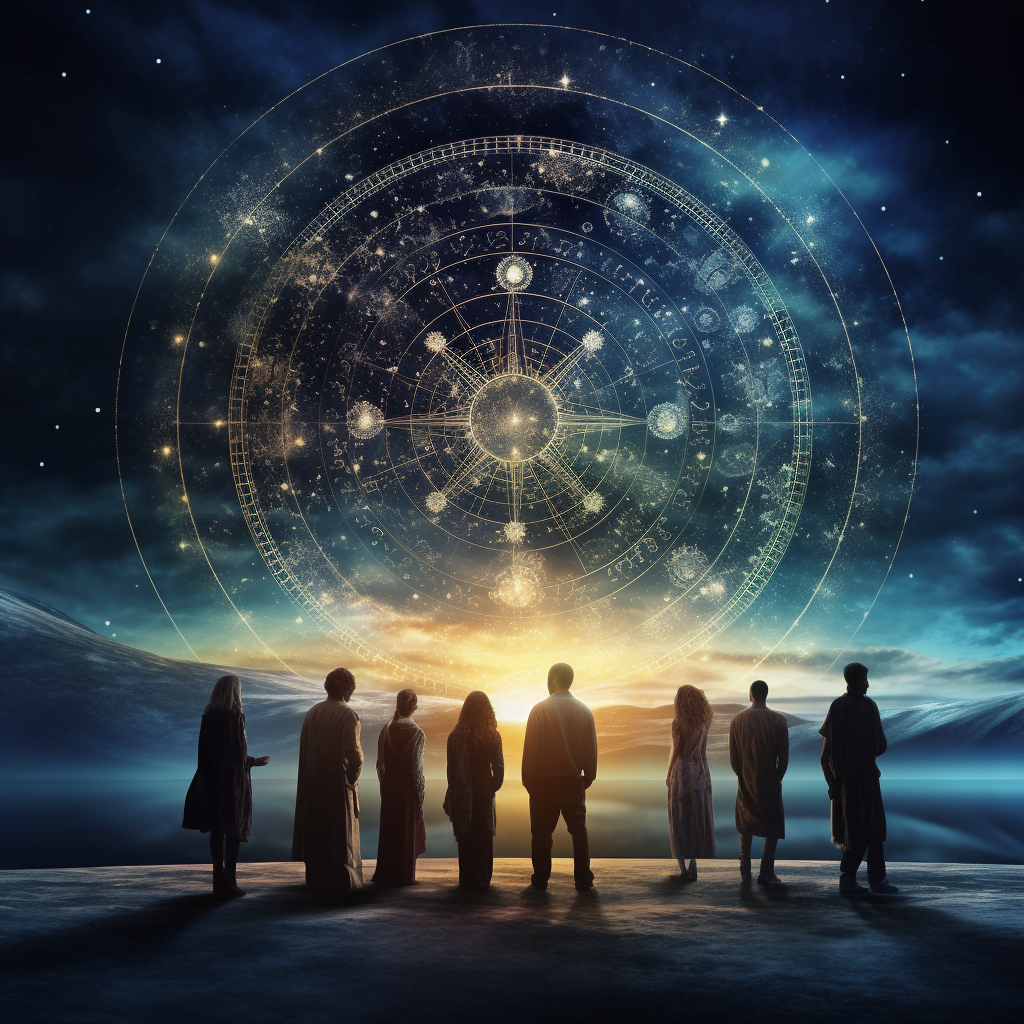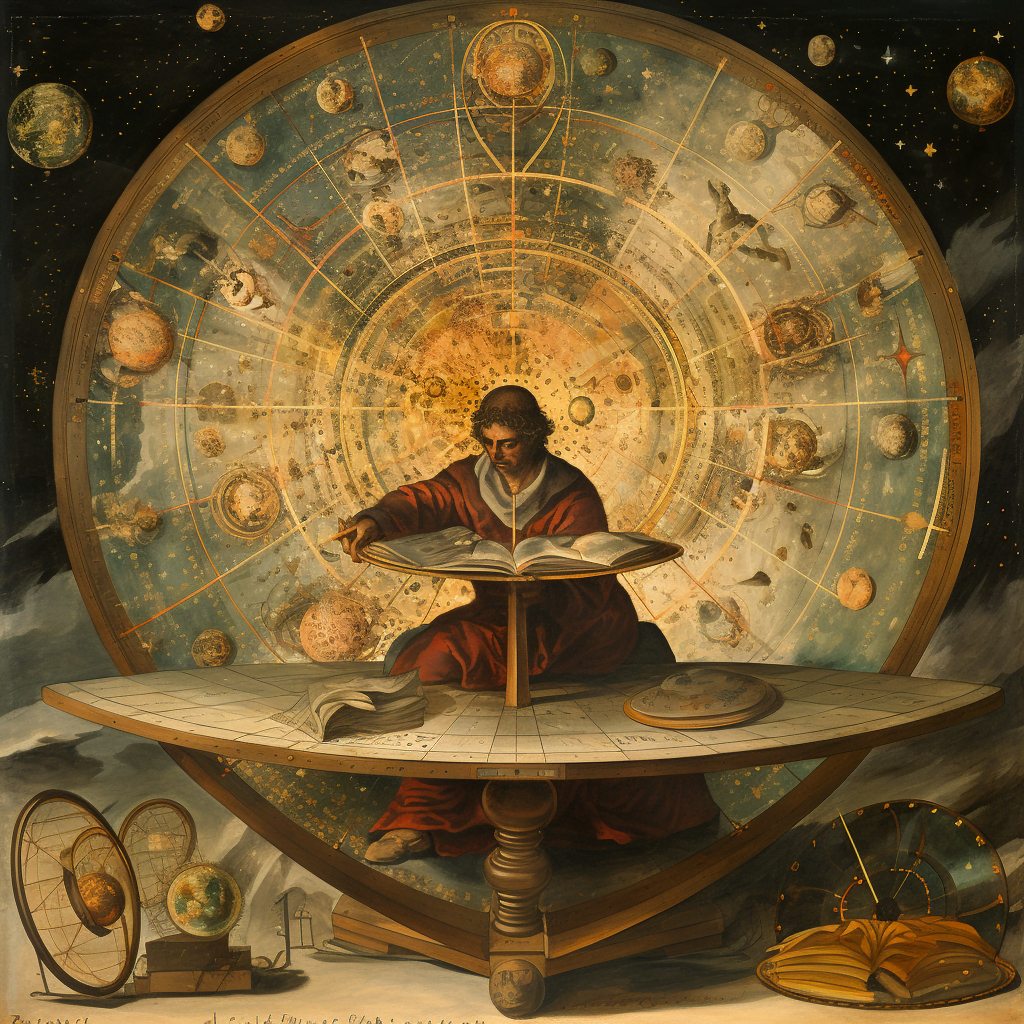Astrology, a widely debated discipline, has long captivated individuals in its various forms. With roots dating back to ancient civilizations, this age-old practice seeks to explore the influence of celestial bodies on human affairs. However, amidst the mystique and allure, one question remains: who determined the basis and fundamentals of astrology? In the realm of astrology, the notion of zodiac signs, which connect individuals to specific personality traits and destinies, is highly significant. In this article, you will delve into the origins and evolution of astrology, seeking to uncover the enigmatic figure or group that first decided the foundations of this intricate belief system.
Origins of Astrology
Ancient Mesopotamia
Astrology, the study of celestial bodies and their influence on human behavior and events, has roots that can be traced back to ancient Mesopotamia. Mesopotamians, who lived in the region around present-day Iraq, believed that the movements of the planets and stars had a direct impact on human affairs. They developed an early form of astrology called Babylonian astrology, which laid the foundation for the later developments in this field.
Ancient Egypt
In ancient Egypt, astrology was closely intertwined with their religious beliefs. The Egyptians believed that the movement of the sun, moon, and other celestial bodies had a profound effect on their lives, and they used astrology to interpret these influences. The Pharaohs, as the political and religious leaders, played a crucial role in the practice of astrology in ancient Egypt, as they were believed to have a direct connection with the gods.
Ancient China
Astrology in ancient China, known as Chinese astrology, dates back more than 2,000 years. The Chinese believed that the heavens played a vital role in shaping the destiny of individuals and the world. They developed a complex system known as the Four Pillars of Destiny, which involved the study of the positions of celestial bodies at the time of a person’s birth. Chinese astrology also incorporated the twelve animal signs of the Chinese zodiac, which are still widely recognized today.
Ancient Greece
Ancient Greece contributed significantly to the development of astrology. Prominent Greek philosophers, such as Pythagoras and Plato, believed that the movements of the celestial bodies held the key to understanding the universe and human existence. Astrology in ancient Greece was deeply intertwined with philosophy and mathematics, with the belief that the planets and stars had a direct influence on human temperament, character traits, and destiny.
Ancient India
Astrology in ancient India, known as Vedic astrology or Jyotish, has its roots in the ancient texts called the Vedas. The Vedas contain extensive knowledge about celestial bodies and their influence on human life. In Vedic astrology, the positions of the planets at the time of a person’s birth are analyzed to determine their life path, potential challenges, and overall destiny. Astrology has played a significant role in Indian culture, influencing various aspects of life including marriage, career, and spirituality.
Ancient Arabia
Astrology also flourished in ancient Arabia, particularly during the Islamic Golden Age. Arab scholars and astronomers made significant contributions to the field of astrology, translating and expanding upon the works of ancient Greek and Indian astrologers. Arabic astrology, also known as Islamic astrology, incorporated elements from different cultures and played a vital role in shaping astrological practices in the Middle East and Europe.
Astrology in Different Cultures
Astrology in Western cultures
Astrology has had a profound impact on Western cultures throughout history. In ancient Greece and Rome, astrology was highly regarded and widely practiced. It was aligned with the philosophical and metaphysical beliefs of the time and played a significant role in guiding individuals’ decisions and understanding their place in the universe. In medieval Europe, astrology was closely tied to religion, with astrologers serving the ruling elites and providing guidance on matters of state and personal affairs.
Astrology in Eastern cultures
In contrast to Western astrology, which focuses primarily on individual personality traits and predictions, astrology in Eastern cultures has a broader scope and is often used for determining auspicious times for events, such as weddings and business ventures. Chinese astrology, in particular, is deeply ingrained in Chinese culture, and its influence can be seen in various aspects of life, including personal relationships, career choices, and even architectural design.
Astrology in African cultures
While astrology in African cultures may not have received as much attention in historical records, it has played a significant role in various African societies. For example, in ancient Egypt, astronomy and astrology were combined, and the movements of celestial bodies were believed to hold great importance in predicting the Nile’s flooding, a vital event for agriculture. In other parts of Africa, astrological beliefs were incorporated into traditional religious practices and played a role in determining important events and rituals.
The Development of Astrology
Ptolemaic Astrology
Ptolemaic astrology, named after the Greek scholar Claudius Ptolemy, emerged during the 2nd century CE and had a lasting impact on astrology’s development. Ptolemy’s work, “Tetrabiblos,” synthesized the astrological knowledge of ancient Greece and Egypt, forming the basis of Western astrology for centuries to come. His writings emphasized the influence of the planets and their positions on human fate and character.
Arabic Astrology
During the Islamic Golden Age, Arab scholars made significant advancements in astrology. They translated ancient Greek and Indian astrological texts into Arabic and expanded upon the existing knowledge. Arab astrologers introduced new techniques, such as the use of planetary houses and aspects, which later became integral parts of Western astrology. The Arab astrologer Al-Kindi, known as the “Philosopher of the Arabs,” made notable contributions by reconciling astrology with Islamic theology.
Medieval and Renaissance Astrology
In medieval Europe, astrology reached its peak of influence. It was deeply intertwined with religious beliefs and played a vital role in guiding personal and political decisions. Astrological predictions affected royal marriages, the timing of battles, and even the health of individuals. During the Renaissance, astrology continued to thrive, with prominent figures like Johannes Kepler and Galileo Galilei being both astronomers and astrologers. However, as science began to emerge as a separate discipline, astrology’s credibility started to wane.
Modern Astrology
In the modern era, astrology has undergone significant changes. With the advent of scientific advancements and the rise of skepticism, astrology shifted from being widely accepted as a science to being predominantly seen as a form of entertainment and personal guidance. Modern astrology often focuses on individual birth charts, horoscopes, and compatibility readings, attracting a wide range of followers who seek insight into their lives and relationships.
Astrology and Astronomy
The relationship between astrology and astronomy
Astrology and astronomy were once deeply intertwined, with early civilizations seeing little distinction between the two disciplines. However, as scientific knowledge advanced, the two fields diverged. Astronomy evolved into a rigorous scientific discipline that focused on understanding celestial bodies’ physical properties and behavior, while astrology retained its focus on the interpretation of celestial influences on human affairs. Today, astronomy is recognized as a legitimate scientific discipline, while astrology is considered a pseudoscience by the scientific community.
Astrology’s decline in credibility
Astrology’s decline in credibility can be attributed to several factors. First, the rise of empirical sciences provided alternative explanations for natural phenomena, which undermined astrology’s claims of influencing human lives. Second, advancements in understanding the physical properties of celestial bodies debunked many astrological assumptions. Lastly, astrology’s association with superstition and vague predictions led to skepticism among intellectuals and scientists, further eroding its credibility.
Contemporary perspectives on astrology
Despite the decline in scientific credibility, astrology continues to have a significant following and influence in contemporary society. Many individuals turn to astrology for guidance, personal insights, and entertainment. While some dismiss it as mere pseudoscience, others appreciate astrology’s ability to provide a sense of meaning and connection to the universe. From newspaper horoscopes to personalized birth chart interpretations, astrology remains a popular aspect of modern culture.
The Role of Astrologers
Astrologers throughout history
Throughout history, astrologers have played various roles in society. In ancient civilizations, they were often closely associated with religious institutions and the ruling elite. They offered advice on matters of state, predicted outcomes of battles, and interpreted celestial omens. As astrology evolved, astrologers became counselors, guides, and interpreters of celestial influences, helping individuals make decisions regarding personal matters, relationships, and career paths. Today, astrologers continue to provide astrological services, offering insights and interpretations to those seeking guidance.
The influence of astrology on society
Astrology’s influence on society has been both profound and pervasive. It has shaped cultural beliefs, influenced the timing of significant events, and guided personal and political decisions. In ancient times, astrological predictions were considered crucial in determining the right time for conducting religious rituals, planting crops, or declaring war. Astrology’s impact is still evident in modern society, with horoscopes being found in newspapers, online publications, and shared widely on social media platforms.
Astrology as a Cultural Phenomenon
Astrology’s popularity in modern times
Astrology’s popularity has experienced a resurgence in modern times. With the advent of the internet and social media, astrology has become more accessible and widespread. People now have easy access to personalized birth chart interpretations, horoscopes, compatibility readings, and astrological advice through various online platforms. Astrology has become an integral part of many individuals’ lives, offering a sense of guidance, self-discovery, and connection to something larger than themselves.
Astrology in popular culture
Astrology’s influence extends beyond personal belief systems and into popular culture. It has been depicted in various forms of media, such as movies, books, and art. From the iconic character of Madame Zeroni in the novel and film “Holes” to the zodiac-themed clothing lines and accessories, astrology’s symbols and concepts have permeated popular culture. It continues to captivate and fascinate people due to its mysterious and alluring nature.
Scientific Examination of Astrology
Scientific studies on astrology
Despite astrology’s classification as a pseudoscience, scientific studies have been conducted to examine its claims. Researchers have explored potential correlations between astrological predictions and real-life outcomes, such as personality traits and compatibility. However, the majority of scientific studies have failed to find statistically significant evidence supporting astrology’s claims. The lack of scientific validation has contributed to the skepticism surrounding astrology in the scientific community.
Critics and skeptics of astrology
Astrology has faced criticism from various quarters, including skeptics, scientists, and rationalists. Critics argue that astrology’s predictions are often ambiguous and generalized, allowing individuals to interpret them to fit their circumstances. They also highlight astrology’s reliance on subjective interpretations rather than testable hypotheses. Skeptics question astrology’s scientific basis and argue that its perceived accuracy can be attributed to psychological factors, such as the Barnum effect and subjective validation.
The Future of Astrology
Astrology’s survival
Astrology’s survival in the modern world is likely to continue due to its enduring appeal and adaptability. Despite scientific skepticism, astrology has persisted throughout history, adapting to cultural shifts and advancements in technology. As long as individuals seek meaning, guidance, and a deeper understanding of themselves and the universe, astrology will likely remain a significant aspect of human culture.
Relevance in the modern world
In an increasingly interconnected and uncertain world, astrology’s relevance may lie in its ability to provide comfort, introspection, and a sense of belonging. Astrology offers individuals a framework through which they can explore themes of identity, self-discovery, and relationship dynamics. It can serve as a tool for self-reflection, fostering empathy, and understanding among individuals. Although astrology may not hold scientific validity, its cultural and psychological significance should not be disregarded.
Ethical Considerations
Ethical implications of astrology
Astrology raises ethical considerations, particularly in the realm of personal and social decision-making. Individuals may make important life choices based solely on astrological advice, potentially impacting their career paths, relationships, and overall well-being. Ethical questions arise regarding the responsibility of astrologers in providing accurate and unbiased information to their clients, ensuring informed consent, and avoiding undue influence and exploitation.
The responsibilities of astrologers
Astrologers have a responsibility to maintain professionalism and integrity in their practice. They should provide their clients with clear information about the limitations and speculative nature of astrology. It is essential for astrologers to continually educate themselves, staying informed about scientific advancements and maintaining honesty in their interpretations and predictions. By adhering to ethical standards, astrologers can enhance the credibility and value of astrology as a personal guidance tool.
Conclusion
Astrology, originating from ancient civilizations such as Mesopotamia, Egypt, China, Greece, India, and Arabia, has been an integral part of human culture for thousands of years. It has evolved and adapted over time, deeply influencing various aspects of societies and peoples’ lives. While astrology has faced challenges to its scientific credibility, its popularity and cultural significance persist in the modern world. As a personal and cultural phenomenon, astrology continues to provide individuals with guidance, introspection, and a connection to something greater, despite its lack of validation in scientific terms.



